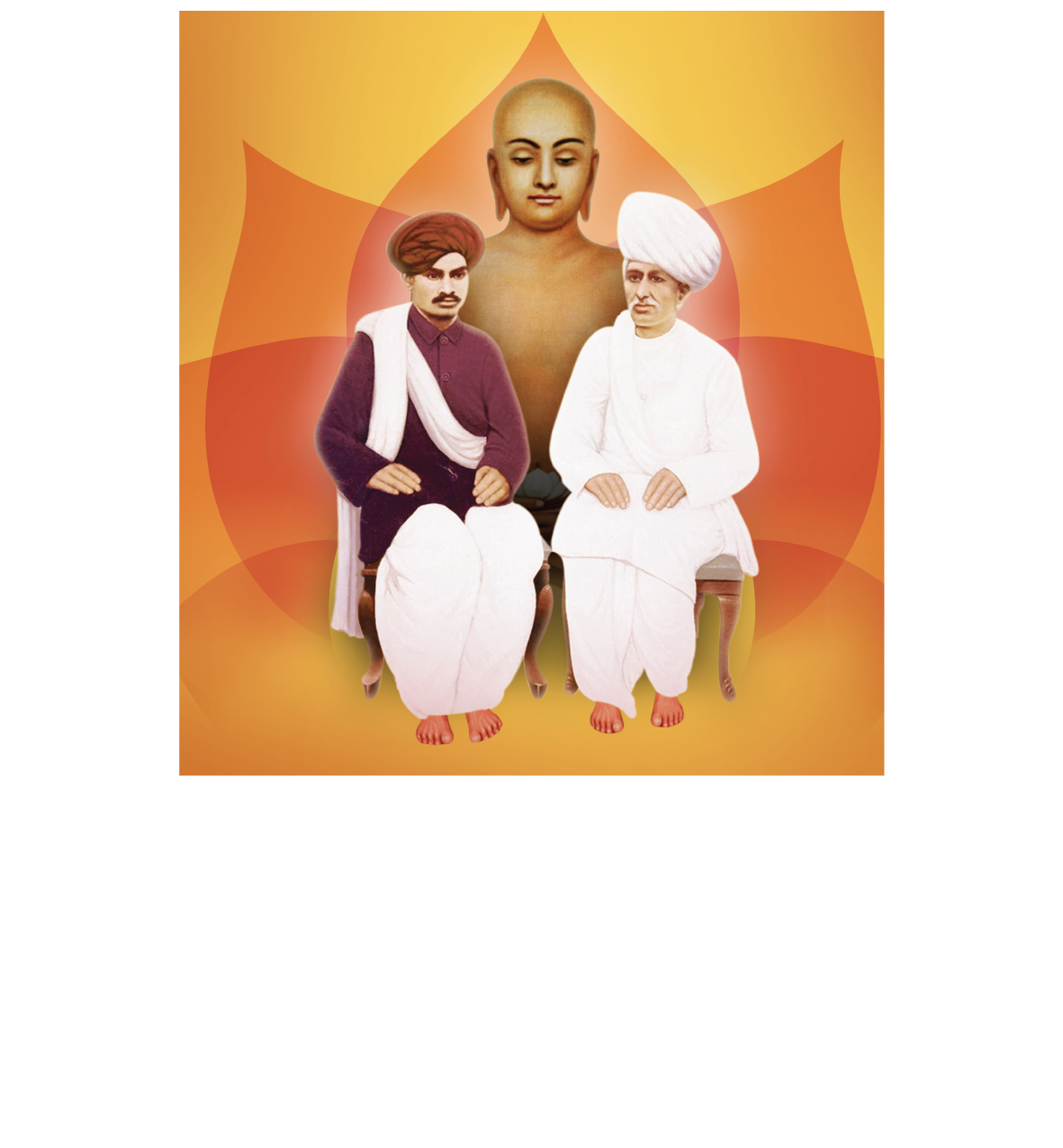“આ શરીર અપવિત્ર છે. મળમૂત્રની ખાણ છે. રોગ-જરાનું નિવાસ ધામ છે, એ શરીરથી હું ન્યારો છું; એમ ચિંતવવું તે છઠ્ઠી અશુચિભાવના
- શ્રીમદ રાજચંદ્ર, વચનામૃત
Transliteration:
Aa sharir apavitra chhe. Malmutrani khaan chhe. Rog-jaranu niwas dhaam chhe, e sharirthi hu nyaaro chhu; em chintavvu te chhathhi Ashuchibhavana.
Translation:
This body is impure. It’s a pit of excretory filth, the abode of disease and ageing. To contemplate that I am distinct from this body is the sixth concept of impurity.”
Ashuchi Bhavana
Ashuchi bhavana refers to the essential impurity of the body. Param Krupalu Dev Shrimad Rajchandra’s Vachanamrut is dotted with references to the body as “mal mutra ni khan” – a filthy mine of solid and liquid wastes.” We are constantly discharging wastes from our body – from our eyes, nose, ears, pores, and the excretory system.
Each one of us is familiar with the body’s inherent tendency to create and discharge waste. The body is made up of flesh, blood, bones and waste matter, the sight of which would be revolting if it wasn’t covered up by skin. The body defiles whatever it touches. The clothes we wear need to be washed and the plates we eat in need to be cleaned; a handshake with another person leaves our hands grimy and sweaty.
Param Pujya Bhaishree evocatively says the plate of food that looked tempting to us looks repulsive after somebody has eaten from it. “Would we eat anybody’s leftovers?” he asks. “The food is the same, but now that it’s been touched and consumed by another person, it loses its appeal.”
The body is the breeding ground of disease. Composed of 3.5 crore such cells, the body is a veritable stockpile of crores of potential health problems, Shrimadji says. Using perfume on a profusely sweating body helps contain the stink emanating from that body but that is an artificial ruse; the perfume overpowers the smell of sweat but it cannot eliminate the smell itself or protect the body from germs created by the creation and expulsion of sweat.
The statement that our body is impure has to be understood in its context. Bodily discharges help keep our body disease-free. These excretions fulfil a vital physiological function. So instead of condemning the body for its tendency to rot and decay, we need to appreciate it for its utility in taking us through our day and helping us fulfil our role in life.
However, the process of appreciating the body could easily stretch into involvement. Such an involvement can be slippery and treacherous. It leads one to identify the self with the body. We end up treating ourselves as a body, no more. We end up harnessing all our resources including our mind to cater to the body, its needs and its relationships. This slide into a sansaaric mirage is counter-productive and sucks us further into the vicious swirl of births and deaths from which there is no escape.
It’s for this reason that we are advised to see our body as a composite of blood, bones and faeces. We can then move beyond its deceptive beauty and explore our inner being which is the core of our existence. To a seeker, the primary and limited aim of his body is to play facilitator of his spiritual growth.
Sanatkumar, a king of supremely magnificent looks, was once bathing when two devtas descended from heaven in human guise to verify whether he was really as handsome as he was famed to be. Awestruck by his looks, they nodded their head gently in approval. A chuffed Sanatkumar then invited them to his court where he would dazzle, decked up in royal finery. The devtas obliged him, and after looking at him in his king’s gear, shook their head. When a puzzled Sanatkumar asked them why did they look disapproving, they told him that his body had changed. It had become poisonous. To prove their point, they asked him to spit. Sanatkumar did and watched a housefly die on consuming a fraction of his spit. The message of the body’s frailty and destructiveness having sunk in, Sanatkumar abdicated his throne, shed his robes and took off on spiritual quest as a monk.
We need to contemplate that no amount of cosmetic and skin treatment can help us stem the perennial rotting of our body. The body is decaying every second, every minute, every day. Our body clock is relentlessly ticking and making our body weaker and wearier. No power on Earth can arrest this decay. Some of us will remain healthier compared to others, but all of us are aging to the same extent every moment. That’s the law of nature. In Nature’s eyes, there is no discrimination between the rich and poor, good and bad, beautiful and ugly.
What comes, goes. The body came with birth and will go with death. Only that which does not have a beginning can be conceived to not have an end. And there is just one such entity - the soul. It has been around forever and will be around forever. It has no beginning or end. Once we grasp the import of this divine knowledge, we open the doors to the boundless power of happiness that is bursting within, waiting to be acknowledged, aching to be experienced.
They say ‘uttam shaucha’ (best cleanliness) is purity. It’s purity of mind that leads us to discover the purity of our soul. And once we land there, there’s no coming back.
““When the mind is still, then truth gets her chance to be heard in the purity of the silence.””
અશુચિ ભાવના
આ શરીર અપવિત્ર છે. મળમૂત્રની ખાણ છે. રોગ-જરાનું નિવાસ ધામ છે, એ શરીરથી હું ન્યારો છું; એમ ચિંતવવું તે છઠ્ઠી અશુચિ ભાવના.- શ્રીમદ્ રાજચંદ્ર, વચનામૃત
અશુચિ એટલે અપવિત્રતા. જે મેલું અને કદરૂપું હોય તે. જે સહન ન થઈ શકે, અરે! જોવું પણ ન ગમે. આ સંસારમાં, અતિ ઘૃણા ઊપજાવે એવું જો કંઈ હોય તો તે છે આપણે ધારણ કરેલું શરીર અને છતાં તેની ઉપર મોટા ભાગના જીવોને ખૂબ મોહભાવ અને પ્રેમ ઊપજે છે. બાહ્યથી ભલે તે દેહ ગમે તેટલો રૂપાળો કે દેખાવડો લાગે પણ પરમકૃપાળુ દેવે તેમજ પૂર્વાચાર્યોએ તે શરીરને “મળ-મૂત્રની ખાણ” એવી ઉપમા આપી તેના સાચા સ્વરૂપનો પરિચય કરાવ્યો છે. આંખ, કાન, નાક અને શરીરમાં રહેલા અસંખ્યાત છિદ્રોમાંથી, સતત મેલ અને મળ નીકળ્યા જ કરે છે. દુર્ગંધ મારતો પરસેવો ઝર્યા જ કરે છે. એક ક્ષણ માટે પણ આપણે આ શરીરની બાહ્ય સુંદરતાનો મોહ ઘટાડવાનો છે. તે શરીર એ જ હું છું, એવી ભ્રામિક માન્યતા અને અભિપ્રાયને હંમેશ માટે તોડી નાંખવાના છે.
ખરેખર તો શરીર પ્રત્યેના ગાઢ મોહ અને મિથ્યાત્વ ભાવ ઉપર આ ભાવના જોરથી પ્રહાર કરે છે. અનંત કાળથી જે માન્યતા ભવભ્રમણનું કારણ બની છે તે આ ભાવનાના અનુપ્રેક્ષણ દ્વારા દૂર થશે. જે ભાવના શરીર પ્રત્યેનો રાગભાવ દૂર કરાવે તે ભાવના કેટલી ઉપકારી ગણાય અને તેને સૂક્ષ્મ રીતે ભાવવી કેટલી આવશ્યક છે એ સમજાય એવું છે.આ ભાવના દ્વારા દેહનું પ્રાધાન્ય ઘટશે, તેને સાચવવા માટેના પ્રયત્નોમાંથી નિવૃત થઈશું અને મૃત્યુના ભયમાંથી મુક્ત બનીશું.
જે શરીરમાં આપણે રહીએ છીએ તે શરીરથી આપણે સુપરિચિત છીએ. હાડકાં, માંસ, લોહી, પરું, શ્લેષ્મ, મળ-મૂત્ર અને મેલથી તે શરીર રચાયેલું છે. તે પુદ્દગલ હોવાથી કાળની સાથે તે જીર્ણ થતું જ રહેશે. કોઈ પણ પદાર્થ શરીર સાથે જોડાય એટલે તે પણ તે શરીરની અશુચિનો સ્પર્શ થતાં જ બગડતો, ગંધાતો, અને નષ્ટ થતો જાય છે. ધોવાયેલા ઇસ્ત્રીબધ્ધ અથવા તો નવા ખરીદેલા કપડાં આ શરીર પર ધારણ કરીએ છીએ અને થોડાં જ કલાકોમાં તેમાંથી વાસ આવવા લાગે છે. ગમે તેટલી સ્વાદિષ્ટ અને કેસરની સુવાસથી મઘમઘે એવી વાનગી હોવા છતાં મોંઢામાં જતાં જ તે વિષ્ટા થઈ જાય છે.
સ્વાધ્યાય દરમિયાન અશુચિ ભાવનાને સમજાવતાં પૂજ્ય ભાઈશ્રી કહે છે કે, એક થાળીમાં અનેક વાનગીઓ પીરસાયેલી હોય અને તેને જોતાં જ ખાવાની ઇચ્છા થાય છે. તે થાળીમાંથી કોઈ અન્ય વ્યક્તિ અડધું જમી લે છે અને પછી તે અડધી ખાધેલી થાળીમાં રહેલો એંઠવાડ શું આપણે ખાવા તૈયાર થઈએ છીએ ખરાં? અન્યને મળતી વખતે જ્યારે તેમના હાથમાં આપણો હાથ મળે ત્યારે તેમના પંજામાં રહેલા પરસેવાની ભીનાશ અનુભવીએ છીએ, ત્યાર બાદ તુરંત આપણે આપણો હાથ લૂંછવા માટે ઉપાય કરીએ છીએ. તે પરસેવાની ભીનાશ આપણે સહન કરી શકતા નથી.
આ શરીર એ તો વેદનાની મૂર્તિ છે. સાડા ત્રણ કરોડ રોમની કાયા અને દરેક રોમમાં પોણા બે રોગ ઉદ્ભવવા માટે તૈયાર ઊભા છે. રોગનું એ ભયંકર ઘર છે. દુઃખનું એ પોટલું છે. પરસેવાથી ઉત્પન્ન થતી ખરાબ વાસને દૂર કરવા આપણે અત્તર કે સુગંધી પરફ્યુમ લગાડીએ છીએ. આ તો કૃત્રિમ ઉપાય છે. થોડા સમય માટે આપણે શરીરના સ્વભાવને ઢાંકી દેવાનો પ્રયત્ન કરીએ છીએ. શરીરની મલિનતાને બરાબર સમજીએ છીએ અને છતાં આવા બાહ્ય ઉપાય કરીને ગર્વ સાથે પોતાને અને પરને છેતરવાનો પ્રયત્ન કરીએ છીએ. ભલે આપણે તે સુગંધી દ્રવ્યોને, કપડાં કે શરીર પર છાંટીએ છીએ, છતાં પરસેવો થતો જ રહે છે. તે પરસેવાને કારણે સૂક્ષ્મ કીટાણુઓ જન્મતા રહેશે. કોઈપણ દ્રવ્યનો મૂળ સ્વભાવ આપણે બદલી શકતા નથી. આ વાત આપણે યાદ રાખવાની છે. દેહ એ પુદગલ દ્રવ્ય છે. તે ભેગું થાય છે, વિખરાય જાય છે. સર્જન તેનું વિસર્જન છે જ. ન જોઈતી હોય એવી તમામ વસ્તુઓ શરીર પોતાના છિદ્રો વડે બહાર કાઢી નાખે છે અને તો જ તેનું અસ્તિત્વ ટકે છે. ખાસ કરીને મનુષ્યનું શરીર એ તો અમૂલ્ય સાધન છે. ભલે તે મળ અને મૂત્રની ખાણ હોય છતાંય તે દ્વારા આપણે આપણું જીવન જીવીએ છીએ. રોજિંદા કાર્યો તે શરીર દ્વારા જ તો કરીએ છીએ. આત્માને રહેવાનું તે ઘર છે. તે શરીરમાં આત્મા પૂરાયેલો છે અને તે જ શરીર દ્વારા સાધના કરીને આત્મા મુક્ત થવાનો છે. એક અપેક્ષાએ તે મંદિર છે. તે સ્વચ્છ રહે અને તેનું આરોગ્ય જળવાય એવી કાળજી લેવાની છે પણ તે દેહને પંપાળવાનો નથી જ.
અજ્ઞાન અવસ્થામાં આ શરીરને આપણે પૂજતા રહ્યા છીએ. આપણું મન અહોરાત્ર તેની સેવા માટે હાજર ઊભું છે. આત્મા કે જેની શક્તિ વડે તે જીવંત અને રમણીય છે તે આત્મા અનંત કાળથી શરીરની ગુલામી ભોગવી રહ્યો છે. શરીર સાથેનો આત્માનો સાંયોગિક સંબંધ છે એ આપણે ભૂલી જઈએ છીએ, જેમ શરીર પર પહેરેલાં કપડાં શરીરથી જુદાં છે તેમ આત્મા શરીરથી તદ્દન જુદો છે, ન્યારો છે. તે શરીર રૂપી છે, દેખાય છે માટે તેની મુખ્યતા થઈ ગઈ અને જે અરૂપી સર્વશક્તિમાન આત્મા છે તેની આપણે અવગણના કરતા રહ્યા છીએ.
વ્યવહારમાં, દરેક સંબંધ શરીર સાથે સ્થપાયેલો છે, પણ ખરેખર તો અંતરમાં ભાવ કરનાર આત્મા છે. સૂક્ષ્મ દ્રષ્ટિ કેળવીએ તો સ્પષ્ટ સમજાય છે કે જે કંઈ વાતચીત, આદાન પ્રદાન અન્ય સાથે કરીએ છીએ તે ખરેખર શરીર સાથે નહીં પણ આત્મા સાથે કરી રહ્યા છીએ. દેહમાં રહેલા એ વિદેહીનાથને મુખ્ય કરી જીવન જીવવાનો સંકલ્પ આપણે કરવાનો છે. પ્રાપ્ત શરીરનો સદ્ઉપયોગ કરીને આપણે આ ભવમાં દર્શન, જ્ઞાન, ચારિત્ર અને તપની આરાધના માત્ર કરવાની છે. દેહની અપવિત્રતાનો વિચાર એટલે કરવાનો છે કે તેથી યોગ પ્રત્યેનો અનાસકત ભાવ જાગે અને સાથોસાથ તે જ દેહને ઉત્તમ સાધન ગણીને આત્માએ પ્રમાદરહિત પુરુષાર્થ કરીને સમ્યક્ પરાક્રમી બનવાનું છે.
અતિ યુવાન અને સુંદર દેહ ધરાવતા મહરાજા સનતકુમાર સ્નાન કરી રહ્યા હતા. ઇન્દ્રની સભામાં સનતકુમારના રૂપના ખૂબ વખાણ થયા ત્યારે બે દેવતાઓએ તે રૂપની પ્રત્યક્ષ પરીક્ષા કરવાનો નિર્ણય લીધો અને બ્રાહ્મણનું સ્વરૂપ ધારણ કરી સનતકુમાર પાસે આવ્યા. સનતકુમારને જોઈ તેઓ આનંદ સાથે આશ્ચર્ય પામ્યા અને પ્રેમથી ઇન્દ્રની વાતને સમર્થન આપતા માથું હલાવ્યું. દેવતાઓ પાસેથી વાત જાણ્યા બાદ અભિમાન સાથે સનતકુમારે તેમને રાજસભામાં આવવા માટે આમંત્રિત કર્યા. ત્યાં પોતે વસ્ત્ર અલંકારોથી સુસજ્જ હશે અને ત્યારે તેમનું રૂપ અતિ ઘણું વધારે શોભિત હશે એવી વાત પણ કરી. ઉત્સુકતા સાથે દેવો રાજ સભામાં ગયા. પણ આ વખતે તેઓએ નકારાત્મક રીતે માથું હલાવ્યું. સનતકુમારે પૂછ્યું ત્યારે તેમણે જણાવ્યું, અત્યારે અભિમાનને કારણે તમારા દેહમાં ઝેર વ્યાપ્યું છે. તમે હમણાં થૂંકો અને તેની ઉપર માખી બેસશે કે તુરંત તે મરી જશે. દેવતાઓએ કહ્યુ તે પ્રમાણે જ થયું અને તેથી આ દેહના અભિમાનને ગાળી નાખવા તેઓએ રાજ્યનો, વસ્ત્ર - અલંકારોનો તેમજ સંસારનો ત્યાગ કર્યો અને સર્વસંગ પરિત્યાગી બની મોક્ષની ઉત્કૃષ્ટ સાધનામાં સ્થિર થયાં.
સૌંદર્યના ગમે તેટલા સાધનોની મદદ લઈએ પણ તે દેહ વૃદ્ધ થતાં અટકવાનો નથી. દેહ ખૂબ સુંદર દેખાય એવા પ્રયત્નોમાં અબુધ અને અજ્ઞાની જોડાય છે. દેહ સુંદર દેખાય એવો ભાવ ઘોર મિથ્યાત્વને પોષણ આપનારો છે. શરીર સાધન છે સાધ્ય નથી. શરીરને શણગારવામાં હું શરીર છું એ ભાવ વધુ સુદ્રઢ થાય છે. વિવિધ જાતના કપડાં, ઘરેણાં કે શૃંગાર કરીને અરીસામાં ઘડી ઘડી જોતા રહેવું, ખુશ થવું એ ગાઢ મિથ્યાત્વ અને અજ્ઞાન અવસ્થા સૂચવે છે.
શરીર ગમે તેવું સુંદર અને યુવાન હોય પણ જરા અને મૃત્યુથી તે બચી શકતું નથી. તીર્થંકર ભગવાનનો દેહ અતિ પવિત્ર હોવા છતાં તે અમર નથી. તે દેહને જાળવવાનો ગમે તેટલો પ્રયત્ન કરીએ તે જળવાતો નથી. એવા દેહમાં મારાપણાનો ભાવ કરીને આ મનુષ્યભવ હારી જવાનો નથી પણ તે દેહ થકી ઉત્તમ આરાધના કરી મોક્ષમાર્ગે આ જ ભવમાં ખૂબ આગળ વધવાનું છે.
જે શાશ્વત છે એનો મહિમા ગાઈએ. માત્ર આત્માનું સ્મરણ અને કીર્તન કરીએ. એ જ સત્ય, શિવ અને સુંદર છે. જે સ્વભાવે સિદ્ધ છે. જે સદૈવ છે જ. તે સચ્ચિદાનંદને ગુણ-લક્ષણથી ઓળખીએ. તે અક્ષય અને અનંત છે. અશુચિ ભાવના તે સેતુ છે જે જીવને દેહથી આત્મા તરફ લઈ જાય છે. પરમ સત્યમાં પ્રતિષ્ઠિત કરાવે છે. અનંત કાળનું મિથ્યાત્વ જેથી દૂર થાય એવી આ ભાવના છે. દેહની વાસના એ જ ભવભ્રમણનું બીજ છે જે આ ભાવના યથાર્થ રીતે ભાવતા બળી જાય છે.
ઉત્તમ શૌચ એટલે પવિત્ર મન, કે જે દ્વારા જડ શરીર અને ચૈતન્ય આત્માનો ભેદ પાડી આપણે છાશમાં રહેલા માખણને પામી શકીએ છીએ.
““મન સ્થિર થાય છે ત્યારે અંદરનો કોલાહલ શાંત થઈ જાય છે. શાંત અને પવિત્ર અંતઃકરણમાં, આત્માનો, પરમ સત્યનો અવાજ સંભળાય છે.””
Feedback and share
We would love to hear your thoughts, contemplations, insights, poetry, video clips, quotes and images. Collectively we learn. You can email us at: contemplate@rajsaubhag.org
Inspiration Wall
Below we share from our audience. We learn from each other. Be inspired to read - others might have perspectives which we may not have thought of before.
Mallinath Bhagwan
A story of Lord Mallinath brings home the impurity of our temporary abode, our body. As a young girl, Malli Kumari was extremely beautiful and graceful. The fame of her beauty prompted six powerful kings, who were her spiritual companions in her previous births, to send marriage proposals for her. Each one of them threatened to go to war if they were rejected. Her father, King Kumbh of Mithila, was alarmed at the prospect of six marching armies but Malli Kumari calmly asked him to call all six kings to see her in a fortnight. Each day before they came, she placed a morsel of food inside a hollow, life-like replica of herself. When the kings arrived and came close to that magnificent statue, they were revolted by the nauseating stench emanating from the decomposing food within the statue. Malli Kumari demonstrated to them how beauty was just skin-deep, and made them aware of who they really were. As realization dawned on the kings, they set off on their incomplete spiritual journey with Malli Kumari who became our 19th Tirthankar.



















